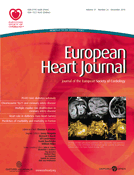 | |
| Discipline | Cardiology |
|---|---|
| Language | English |
| Edited by | Filippo Crea |
| Publication details | |
| History | 1980–present |
| Publisher | |
| Frequency | 48/year |
| 35.855 (2021) | |
| Standard abbreviations | |
| ISO 4 | Eur. Heart J. |
| Indexing | |
| CODEN | EHJODF |
| ISSN | 0195-668X (print) 1522-9645 (web) |
| LCCN | sn79009215 |
| OCLC no. | 05585193 |
| Links | |
The European Heart Journal is a peer-reviewed medical journal of cardiology published by Oxford University Press on a weekly basis, on behalf of the European Society of Cardiology. The first issue was published in February 1980.
